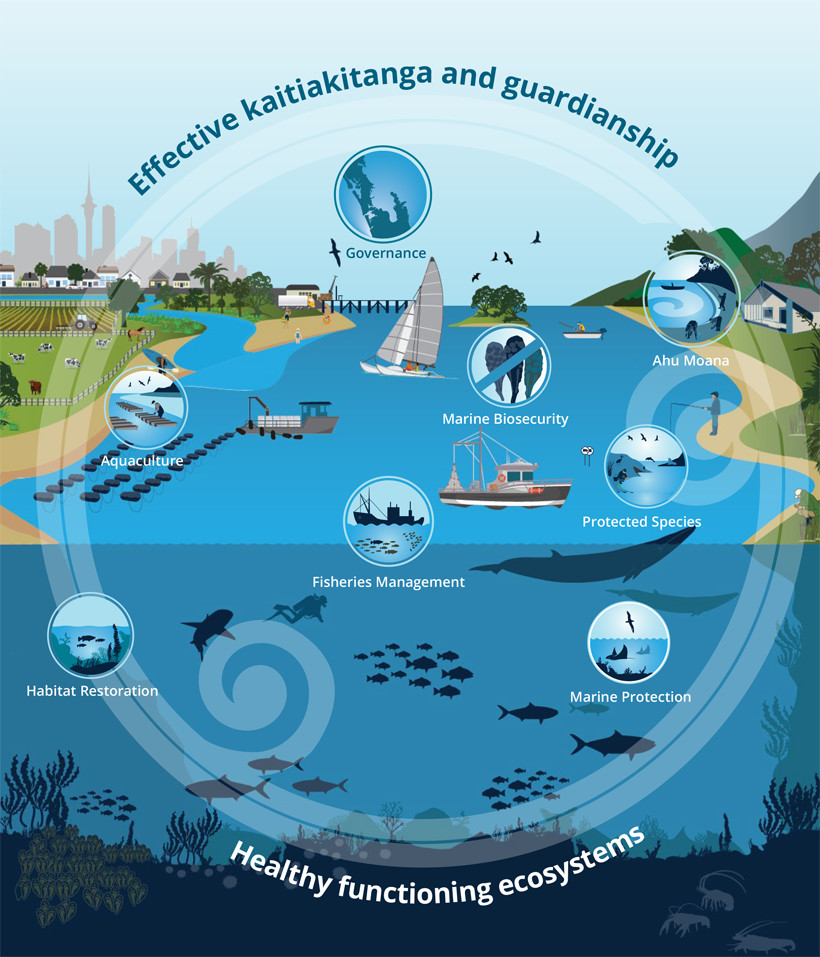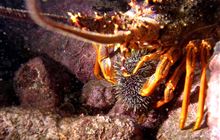Revitalising the Gulf: Government action to restore the Hauraki Gulf/Tīkapa Moana
Introduction
Revitalising the Gulf addresses the management of one of the country’s most valued and intensively used coastal spaces. It sets out a package of marine conservation and fisheries management actions to restore a healthy Hauraki Gulf/Tīkapa Moana.New marine protections in the Hauraki Gulf/Tīkapa Moana
Find details about the Hauraki Gulf/Tīkapa Moana Marine Protection Bill and the process on the New Zealand Parliament website.
Learn more about the proposed marine protections in Hauraki Gulf/Tīkapa Moana.
Revitalising the Gulf
The Hauraki Gulf/Tīkapa Moana (the Gulf) is one of our most valued coastal spaces. However, it has been badly damaged by human activities, both at sea and on the land.
This damage has caused the fish, marine life and seabird populations, and their habitats to decline. This has a huge impact on other life in the Gulf such as removing the vital resources they need to thrive. It also impacts local communities and tangata whenua, as a healthy ecosystem supports spiritual, cultural and economic wellbeing.
The ‘Revitalising the Gulf’ marine work programme aims to revitalise the area and enhance its blue waters, rocky reefs and underwater habitats.
Building on the Sea Change – Tai Timu Tai Pari Hauraki Gulf Marine Spatial Plan, this work programme encompasses valuable feedback from tangata whenua, implementation partners, and key stakeholders.
Work streams are led by DOC, and Fisheries New Zealand.
Read the full strategy:
Our action plan
The Revitalising the Gulf Strategy sets out the marine-based actions Government is taking working alongside tangata whenua, stakeholders, and local communities to restore the health of the Hauraki Gulf/Tīkapa Moana.
It is guided by two overarching goals:
- Effective kaitiakitanga and guardianship in the Gulf
- Healthy functioning ecosystems that:
- underpin the wellbeing and prosperity of people who live, work and play in the Gulf
- sustain healthy fisheries that replenish and enhance the pātaka kai (food basket) for customary, recreational and commercial uses
- regulate, support and sustain the Gulf
- support resilient and diverse habitats and marine life.
Marine-based actions to meet our goals
There are 8 key actions in the Revitalising the Gulf strategy.
- Marine protection – Create and manage 19 new protection areas. This supports wildlife to recover in the most diverse areas and seafloors.
- Fisheries management – Develop an area-based fisheries plan for commercial, recreational and customary fishing, and their effects on the Hauraki Gulf/Tīkapa Moana. Hauraki Gulf Fisheries Plan
- Active habitat restoration – Provide a framework to direct resources and focus work on the best ways to restore habitats.
- Aquaculture – Support a prosperous industry for farming fish or other wildlife in the sea, which is secure and sustainable.
- Marine biosecurity – Continue work to prevent and manage threats to ocean life from exotic species, contamination and diseases through the Top of the North Marine Biosecurity Partnership.
- Protected species – Expand the programme of management, research and monitoring of protected species.
- Ahu Moana – Facilitate and support tangata whenua and local communities to manage nearshore coastal areas.
- Governance – Establish a Cross-Agency Implementation Group comprising DOC and MPI/FNZ to oversee the actions of this strategy.

The eight action areas that will revitalise the gulf
Tracking and supporting the strategy
The Strategy’s actions will be supported by a programme to track how well they are working. It will include research, monitoring and reporting.
The review programme will drive an adaptive management approach to deliver the best results for the Gulf.
These actions complement the Government’s non-marine work programmes such as the Essential Freshwater work programme.
Revitalising the Gulf timeline
- In April 2017, the Sea Change – Tai Timu Tai Pari Hauraki Gulf Marine Spatial Plan was published.
- In July 2019, an independent Sea Change Tai Timu Tai Pari Ministerial Advisory Committee was established to provide feedback and advice to Ministers, Fisheries New Zealand and DOC.
- In September 2020, the Committee published a report on their findings and recommendations Read the report (PDF, 504K)
- In June 2021, the Government released the strategy to revitalise the Hauraki Gulf. Read Revitalising the Gulf: At a Glance summary (PDF, 2,131K)
- In August 2023, The Hauraki Gulf Fisheries Plan was approved by the Minister for Oceans and Fisheries. This is New Zealand's first area-based fisheries plan and is tailored to the needs and challenges of the Gulf and its communities.
Marine protection timeline
- A large component of Revitalising the Gulf is the creation and management of 19 new protection areas.
- In November 2021 to February 2022, Tangata whenua provided feedback on how marine protection proposals could best respond to their rights, interests, and aspirations as rangatira and kaitiaki.
- In September – November 2022, consultation was carried out on the proposals. Read the information document (PDF, 1,286 K)
- In December 2022, DOC provided advice on policy decisions to Ministers. Ministers secured Cabinet approval and instructed the Parliamentary Counsel Office to start drafting the Bill. The cabinet paper, advice to Ministers and Regulatory Impact Statement are available to read below.
- In 2023, DOC provided further policy advice to Ministers. Ministers secured Cabinet approval for the Bill to be introduced to the House of Representatives and to issue drafting instructions to PCO for regulations under the Bill.
- 23-B-0183 Briefing: Minor and technical decisions for Hauraki Gulf Marine Protection Bill (PDF, 1,676K)
- 23- B-0291 Briefing: Ministerial consultation on the Hauraki Gulf Marine Protection Bill and associated Cabinet paper (PDF, 1,095K)
- 23-B-0310 Briefing: Final minor decisions on the Hauraki Gulf Tīkapa Moana Marine Protection Bill (PDF, 925K)
- 23-B-0358 Briefing: Final policy decision and cabinet paper for the Hauraki Gulf Tīkapa Moana Marine Protection Bill (PDF, 880K)
- Cabinet paper: The Hauraki Gulf Tīkapa Moana Marine Protection Bill Approval for Introduction (PDF, 5,406K)
- LEG-23-MIN-0151 Minute of Decision: Hauraki Gulf Tīkapa Moana Marine Protection Bill - Approval for Introduction (PDF, 727K)
- In 2024, DOC provided further advice to the Minister of Conservation. The Bill progressed through the Environment Select Committee process. The Minister of Conservation secured Cabinet approval for proposed amendments to be voted on at the Committee of the Whole House.
- 24-B-0317: Briefing – Hauraki Gulf / Tīkapa Moana Marine Protection Bill – further advice and proactive release of documents (DOC, 513K)
- Cabinet Paper ‘Progressing the Hauraki Gulf / Tīkapa Moana Marine Protection Bill’ (PDF, 235K)
- Cabinet Minute ‘Progressing the Hauraki Gulf / Tīkapa Moana Marine Protection Bill’ (PDF, 123K)
- 23-B-0504: Memo - Initial brief for the Environment Select Committee hearing on the Hauraki Gulf / Tīkapa Moana Marine Protection Bill, 21 December 2023 (PDF, 292K)
- 24-B-0105: Briefing - Hauraki Gulf / Tīkapa Moana Marine Protection Bill: Further policy decisions arising from submissions to Select Committee (PDF, 123K)
- 24-B-0106: Briefing - Hauraki Gulf / Tīkapa Moana Marine Protection Bill: Approval of Departmental Report to Select Committee (PDF, 123K)
- 24-B-0120: Memo - Progressing the Hauraki Gulf / Tīkapa Moana Marine Protection Bill (PDF, 139K)
- 24-K-0015: Cabinet paper talking points - Progressing the Hauraki Gulf / Tīkapa Moana Marine Protection Bill (PDF, 620K)
- 24-B-0283: Briefing - Next steps for the Hauraki Gulf / Tīkapa Moana Marine Protection Bill (PDF, 265K)
- 24-B-0348: Memo - Background to clause 9A of the Hauraki Gulf / Tīkapa Moana Marine Protection Bill (PDF, 174K)
- 24-B-0412: Memo - Report back on the Hauraki Gulf / Tīkapa Moana Marine Protection Bill (PDF, 179K)
- 24-K-0027: Cabinet paper talking points - Report back on the Hauraki Gulf / Tīkapa Moana Marine Protection Bill (PDF, 544K)
- 24-B-0476: Briefing - Ring-net fishing in high protection areas (PDF, 199K
- LEG Cabinet paper ‘Report back on the Hauraki Gulf / Tīkapa Moana Marine Protection Bill’ (PDF, 189K)
- Cabinet paper ‘Report back on the Hauraki Gulf / Tīkapa Moana Marine Protection Bill’ (PDF, 324K)
- Cabinet minute ‘Report back on the Hauraki Gulf / Tīkapa Moana Marine Protection Bill’ (PDF, 129K)
Sea change: A plan made through collaboration
Revitalising the Gulf is in response to the 2017 Sea Change – Tai Timu Tai Pari Hauraki Gulf Marine Spatial Plan.
The 2017 Sea Change Plan was a call to action to improve the health and mauri of the Gulf.
This non-statutory plan was developed over three years by a 14-member stakeholder working group. The group represented tangata whenua, environmental groups, and the fishing, aquaculture and agriculture sectors.
The Sea Change Plan made over 180 proposals for the Gulf and its catchments across land, freshwater and marine domains. These informed the Revitalising the Gulf plan.
Find out more about Sea Change - Tai Timu Tai Pari.
Contacts
Contact the Department of Conservation at revitalisingthegulf@doc.govt.nz.
You can also contact Ministry for Primary Industries/Fisheries New Zealand at seachange@mpi.govt.nz


